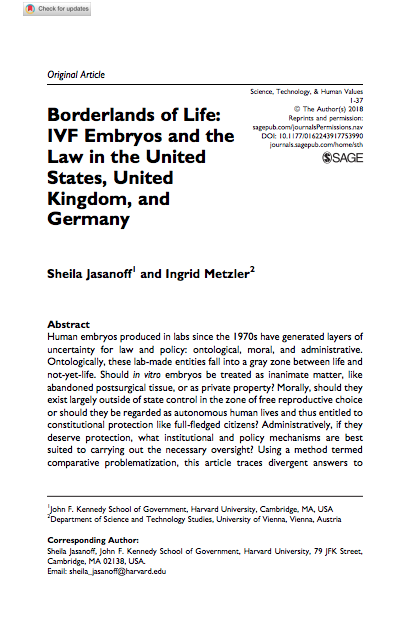
"Human embryos produced in labs since the 1970s have generated layers of uncertainty for law and policy: ontological, moral, and administrative. Ontologically, these lab-made entities fall into a gray zone between life and not-yet-life. Should in vitro embryos be treated as inanimate matter, like abandoned postsurgical tissue, or as private property? Morally, should they exist largely outside of state control in the zone of free reproductive choice or should they be regarded as autonomous human lives and thus entitled to constitutional protection like full-fledged citizens? Administratively, if they deserve protection, what institutional and policy mechanisms are best suited to carrying out the necessary oversight? Using a method termed comparative problematization, this article traces divergent answers to these questions produced in three countries—the United States, United Kingdom, and Germany—across the last twenty-five years. Comparison reveals distinct bioconstitutional foundations that give rise to systematically different understandings of each state’s responsibilities toward human life and hence its particular treatment of claims on behalf of embryonic lives."
Keywords: bioconstitutionalism, comparative problematization, ontological surgery, IVF embryos, stem cells
Sheila Jasanoff and Ingrid Metzler, "2018. Jasanoff and Metzler. "Borderlands of Life: IVF Embryos and the Law in the United States, United Kingdom, and Germany"", contributed by , STS Infrastructures, Platform for Experimental Collaborative Ethnography, last modified 27 May 2018, accessed 13 March 2025. https://stsinfrastructures.org/content/2018-jasanoff-and-metzler-borderlands-life-ivf-embryos-and-law-united-states-united-kingdom
Critical Commentary
In this 2018 article, Sheila Jasanoff and Ingrid Metzler introduce a method they term "comparative problematization," with which they examine the law and policy around human embryos in several countries across a period of 25 years.